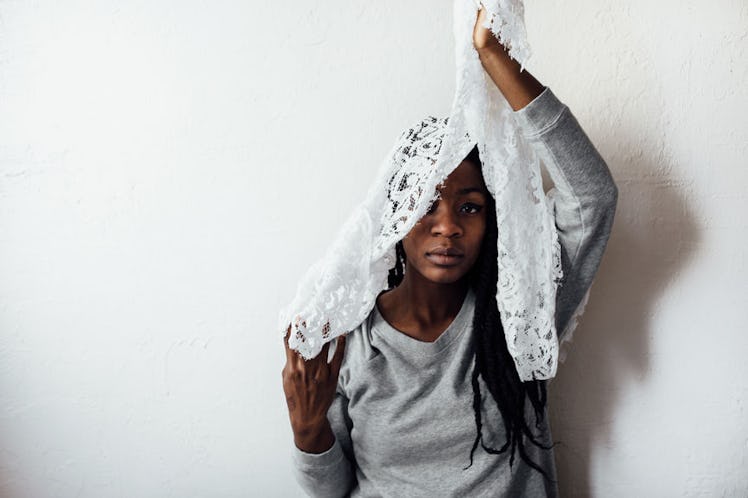
Melatonin Definitely Works, But Here's Why Some Experts Don't Recommend It
This past Saturday night, I was determined to make up for the less-than-ideal sleep I'd had the week before. I took a warm bath, put lavender oil into my essential oil diffuser, and made sure my blinds were shut completely to avoid an early sunshine wake-up. The final step to my "sleep at least nine hours" plan was to pop some melatonin. I'm pleased to say that overall, I slept for almost 10 hours that night, but I did find myself waking up a couple of times, which isn't normal for me. Does melatonin work, or was the soothing slumber I experienced mostly due to a placebo effect? According to experts, melatonin might help you doze off, but there are some possible drawbacks you should probably know about.
What you might not realize about melatonin is that your body already produces a certain amount of the sleep-inducing stuff. "Melatonin is a hormone, mainly produced by the pineal gland in the brain, that helps regulate our sleep-wake cycle and circadian rhythm (internal clock)," Ysabel Montemayor, registered dietitian for meal delivery service Fresh n' Lean, tells Elite Daily. "In general, darkness causes an increase in melatonin production, signaling sleep, and light decreases melatonin production, signaling wakefulness."
In other words, a melatonin supplement basically mimics that same sleep-signaling effect in your body, and before you know it, you can barely keep your eyes open.
Personally, one of my main concerns about taking melatonin is its potential for being habit-forming; I don't want to have to rely on it, you know? However, despite stories I've heard about becoming dependent on the supplement every single night to help you fall asleep, Montemayor explains, "As of now, long-term use of melatonin appears to be safe and does not increase tolerance or cause dependence, but more research is needed." So, overall, she says, melatonin is safe, but it's worth noting that "too much may cause side effects such as drowsiness, headache, dizziness, nausea, and symptoms of depression."
Melatonin may technically be safe to use — it certainly doesn't seem like it'll hurt you, per se — but according to Joseph Chandler, a sleep expert and assistant professor of psychology at Birmingham-Southern College, taking the stuff isn't always the best solution to sleep troubles. "Taking the supplement makes your body ramp down its own production [of melatonin], which is a bad thing," he tells Elite Daily in an email. "The best thing to do is get 15 to 20 minutes of good old-fashioned sunlight mid-morning and mid-afternoon. That will make your body's own production of melatonin incredibly efficient and effective."
Plus, sunshine is free, so if you can take a short break from work in the middle of the day, you'll be doing your body a favor.
If you do want to start taking melatonin, Rachel Fine MS, RD, CSSD, CDN, a registered dietitian and owner of To The Pointe Nutrition, suggests you only take it when you need it as opposed to every night, and that you ask your doctor before you add it to your routine. "Melatonin can potentially affect blood pressure as well as testosterone and estrogen levels," she tells Elite Daily. "Melatonin can also interact with certain foods and medications."
Don't forget, you can always boost your body's production of melatonin naturally through your diet, not just via supplements. Haley Hughes, MS, registered dietitian and certified diabetes educator, recommends eating foods rich in magnesium, a mineral which, she explains, calms the nervous system and relaxes your muscles, easing you into sleep. "It also regulates melatonin," she tells Elite Daily.
To keep your magnesium levels up, the RD suggests snacking on foods like pumpkin seeds, nut butters, and avocado. Sounds yummier than a supplement, I have to admit.